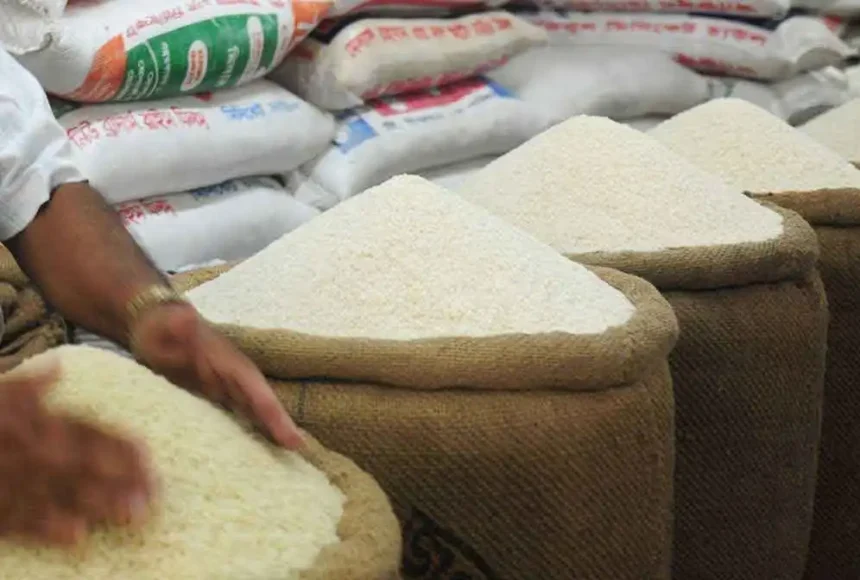Main Points In Hindi (मुख्य बातें – हिंदी में)
-
जांच समिति की कमी: यूरोपीय संघ में पाकिस्तान के चावल शिपमेंट के अवरोधन की जांच के लिए गठित समिति ने प्रमुख तकनीकी मुद्दों की अनदेखी की है, जबकि अधिकारियों का मानना है कि समिति का ध्यान केवल मंत्रालय और उसके विभाग को परेशान करने पर केंद्रित है।
-
नौकरशाही की समस्या: पाकिस्तान की नौकरशाही की अक्षमता, भ्रष्टाचार और वफादारी आधारित नियुक्तियों ने खाद्य सुरक्षा और नियामक ढांचे में प्रणालीगत विफलताएँ उत्पन्न की हैं, जिससे तकनीकी कर्मचारियों की कमी और प्रभावी शासन में बाधा उत्पन्न हुई है।
-
खाद्य सुरक्षा में कमियाँ: खाद्य सुरक्षा नियमों की कमी और निरीक्षण की जिम्मेदारियों का गलत संरेखण निर्यातकों को अंतरराष्ट्रीय जांच के दायरे में लाकर चावल निर्यात को प्रभावित कर रहा है, जबकि DPP की सीमित भूमिका इसे और बढ़ा रही है।
-
संसाधनों की कमी: DPP में केवल 21 नियमित तकनीकी कर्मचारी हैं, जो निरीक्षण उपकरणों और सुविधाओं की अनुपस्थिति में कार्य कर रहे हैं। इसके विपरीत, पड़ोसी देशों में इस क्षेत्र में अधिक संसाधन आवंटित किए गए हैं।
- संविधानिक और समन्वय की आवश्यकता: विशेषज्ञ एक मजबूत संघीय खाद्य सुरक्षा नियमों के निर्माण, तकनीकी जनशक्ति में निवेश और विभिन्न मंत्रालयों और प्रांतीय अधिकारियों के बीच बेहतर समन्वय की आवश्यकता पर जोर दे रहे हैं, जिससे पाकिस्तान की निर्यात क्षमता को मजबूत किया जा सके।
Main Points In English(मुख्य बातें – अंग्रेज़ी में)
Here are the main points from the article regarding the issues faced by Pakistan’s rice exports to the European Union:
-
Investigation Committee’s Shortcomings: A high-level investigation committee created to look into the blocking of Pakistan’s rice shipments to the EU has failed to address key technical issues related to pesticide residue and compliance with maximum residue limits (MRLs). The Ministry of National Food Security and Research (MNFSR) believes the committee is diverting attention from the root causes of these blocks.
-
Systemic Failures in Governance: Pakistan’s bureaucratic inefficiencies, stemming from a colonial legacy, have led to systemic failures within key institutions like the Plant Protection Department (DPP). Challenges include corruption, lack of qualified staff, and inadequate regulatory frameworks, which hinder effective governance and food safety compliance.
-
Export Challenges Amid High Performance: Despite achieving a historic rice export target of $3.88 billion in FY 2023-2024, Pakistan’s rice exports face increasing scrutiny in global markets due to food safety violations, highlighted by recent EU blocks due to issues like pesticide residues and genetically modified organisms (GMOs).
-
Lack of Coordination and Resources: The DPP is hampered by inadequate resources, employing only 21 regular technical staff and facing delays in wages, which impacts its operational efficiency. In contrast, neighboring countries allocate significantly more personnel for similar roles. The lack of coordination between relevant ministries further complicates compliance with international food safety standards.
- Need for Comprehensive Solutions: Experts emphasize that rather than scapegoating the DPP, stakeholders must address systemic issues plaguing Pakistan’s export capacity. To enhance food safety compliance and protect the country’s reputation in global markets, a well-resourced, coordinated, and coherent approach involving various ministries and stronger federal regulations is essential.


Complete News In Hindi(पूरी खबर – हिंदी में)
इस्लामाबाद: कीट संदूषण और आनुवंशिक रूप से संशोधित जीवों (जीएमओ) के कारण यूरोपीय संघ (ईयू) में पाकिस्तान के चावल शिपमेंट के अवरोधन की जांच के लिए गठित एक उच्च स्तरीय जांच समिति ने प्रमुख तकनीकी मुद्दों की अनदेखी की है।
वास्तव में, राष्ट्रीय खाद्य सुरक्षा और अनुसंधान मंत्रालय (एमएनएफएसआर) के अधिकारियों का मानना है कि समिति के निष्कर्ष केवल मंत्रालय और उसके पादप संरक्षण विभाग (डीपीपी) को अनावश्यक रूप से परेशान करने पर केंद्रित हैं, जिससे उनका ध्यान इस बात से हट जाता है कि इनका मुख्य कारण क्या है। अवरोधन।
डीपीपी के अधिकारियों का मानना है कि प्रधान मंत्री द्वारा गठित जांच समिति, खाद्य सुरक्षा और अधिकतम अवशेष सीमा (एमआरएल) मानकों में अनुपालन अंतराल जैसे मूल कारणों को संबोधित करने में विफल रही है। सचिव एमएनएफएसआर ने नेशनल असेंबली की स्थायी समिति को सूचित किया कि जांच के निष्कर्ष पूरे हो गए हैं और जल्द ही प्रधानमंत्री को सौंपे जाएंगे।
शासन में प्रणालीगत शिथिलता:
पाकिस्तान की नौकरशाही अक्षमता-अक्सर औपनिवेशिक प्रशासन की विरासत-प्रभावी शासन में बाधा बनी हुई है। नौकरशाही भ्रष्टाचार, राजनीतिक हस्तक्षेप और योग्यता के बजाय वफादारी के आधार पर नियुक्तियों के कारण प्रमुख संस्थानों में प्रणालीगत विफलताएँ हुई हैं। डीपीपी के मामले में, ये मुद्दे योग्य तकनीकी कर्मचारियों की कमी और अपर्याप्त नियामक ढांचे के माध्यम से प्रकट होते हैं।
वित्तीय वर्ष 2023-2024 में $3.88 बिलियन का चावल निर्यात करने के बावजूद – अपने इतिहास में सबसे अधिक – पाकिस्तान के चावल निर्यात को खाद्य सुरक्षा उल्लंघनों के कारण वैश्विक बाजारों में बढ़ती जांच का सामना करना पड़ रहा है। यूरोपीय संघ में हालिया अवरोधन ने कीटनाशक अवशेष, एफ्लाटॉक्सिन और जीएमओ जैसे मुद्दों को चिह्नित किया। हालाँकि, खाद्य सुरक्षा निरीक्षण में डीपीपी की सीमित भूमिका सरकारी विभागों में जिम्मेदारियों के गलत संरेखण को उजागर करती है।
अपराधी कौन है?
जैसा कि अधिकांश जांचों में होता है, समस्या जो दिखाई देती है उससे कहीं अधिक जटिल है। प्रॉफिट से बात करते हुए, डीपीपी के अधिकारियों ने कहा कि डीपीपी का जनादेश पाकिस्तान प्लांट क्वारंटाइन नियम, 2019 के तहत जैव सुरक्षा और फाइटोसैनिटरी अनुपालन तक सीमित है। खाद्य सुरक्षा उपाय, जैसे कोडेक्स एलिमेंटेरियस मानकों का अनुपालन सुनिश्चित करना, राष्ट्रीय स्वास्थ्य मंत्रालय के अंतर्गत आते हैं। सेवा विनियमन और समन्वय (MoNHSR&C)।
निर्यातक खाद्य सुरक्षा निरीक्षण के लिए एसजीएस ग्रुप जैसी निजी कंपनियों पर भरोसा करते हैं, जैसा कि पिछली सरकार के कार्यकाल के दौरान नीतिगत बदलाव द्वारा निर्धारित किया गया था।
हालाँकि, पाकिस्तान में संघीय खाद्य सुरक्षा नियमों की कमी ने समस्या को बढ़ा दिया है, जिससे निर्यातक अंतरराष्ट्रीय जांच के दायरे में आ गए हैं।
हालांकि उपर्युक्त सच है, यह ध्यान रखना भी महत्वपूर्ण है कि कीटनाशक अवशेषों जैसे अवरोधों के साथ सभी मौजूदा चिंताएं प्रत्यक्ष या अप्रत्यक्ष रूप से फोटोसैनिटरी और जैव सुरक्षा उपायों में चूक के कारण भी हो सकती हैं।
ब्रुसेल्स में पाकिस्तान के आर्थिक मंत्री, ओमर हमीद, जिन्होंने चावल अवरोधन के संबंध में एक पत्र लिखा था, ने अधिकांश दोष डीपीपी को दिया।
जांच समिति के रवैये पर सवाल खड़े हो गए हैं। हालाँकि इसने डीपीपी के संचालन की जाँच की, लेकिन यह महत्वपूर्ण प्रश्नों का समाधान करने में विफल रहा:
• दशकों पहले कोडेक्स एलिमेंटेरियस कमीशन में शामिल होने के बावजूद पाकिस्तान ने संघीय खाद्य सुरक्षा नियम क्यों नहीं बनाए हैं?
• प्रांतीय खाद्य सुरक्षा अधिकारियों और कृषि विभागों ने चावल क्षेत्रों में अपंजीकृत कीटनाशकों के उपयोग को प्रतिबंधित क्यों नहीं किया है?
• MoNHSR&C ने EU से अवरोधन सूचनाओं पर कार्रवाई क्यों नहीं की?
इसके अलावा, बार-बार अनुरोध करने के बावजूद, आर्थिक मंत्रालय ने ईयू कोडेक्स मंचों पर पाकिस्तान का प्रतिनिधित्व करने के लिए एक डीपीपी अधिकारी को नियुक्त नहीं किया है, जिससे तकनीकी व्यापार बाधाओं को दूर करने की देश की क्षमता में बाधा आ रही है।
अपर्याप्त संसाधन डीपीपी में बाधा डालते हैं:
डीपीपी केवल 21 नियमित तकनीकी कर्मचारियों और 50 अनुबंध कर्मचारियों के साथ काम करता है, जिन्हें अक्सर वेतन में देरी का सामना करना पड़ता है और प्रमुख बंदरगाहों पर उचित निरीक्षण उपकरण या सुविधाओं के बिना काम करना पड़ता है। तुलनात्मक रूप से, ईरान और भारत जैसे पड़ोसी देशों ने समान भूमिकाओं में सैकड़ों कर्मचारी आवंटित किए हैं।
विभाग के अधिकारियों का कहना है कि इन बाधाओं के बावजूद, डीपीपी ने 150 से अधिक देशों में चावल निर्यात को सफलतापूर्वक प्रमाणित किया है, जिसमें कीट संदूषण के कारण केवल एक अवरोध की सूचना मिली है।
वर्तमान जांच पाकिस्तान के खंडित नियामक परिदृश्य को रेखांकित करती है। विशेषज्ञ इस बात पर जोर देते हैं कि खाद्य सुरक्षा अनुपालन में सुधार के लिए मजबूत संघीय नियमों की स्थापना, तकनीकी जनशक्ति में निवेश और संबंधित मंत्रालयों और प्रांतीय अधिकारियों के बीच बेहतर समन्वय की आवश्यकता है।
डीपीपी को बलि का बकरा बनाने के बजाय, हितधारकों को पाकिस्तान की निर्यात क्षमता को कमजोर करने वाले प्रणालीगत मुद्दों का समाधान करना चाहिए। वैश्विक बाजारों में देश की प्रतिष्ठा की रक्षा के लिए एक सामंजस्यपूर्ण, अच्छी तरह से संसाधनयुक्त दृष्टिकोण महत्वपूर्ण है।
Complete News In English(पूरी खबर – अंग्रेज़ी में)
Islamabad: A high-level investigation committee formed to look into the blockade of Pakistan’s rice shipments in the European Union (EU) due to pest contamination and genetically modified organisms (GMOs) has overlooked key technical issues.
Officials from the Ministry of National Food Security and Research (MNFSR) believe that the committee’s conclusions mainly focus on causing unnecessary disturbance to the ministry and its Plant Protection Department (DPP), diverting attention from the actual causes of the blockages.


DPP officials argue that the investigation committee established by the Prime Minister failed to address fundamental issues, such as compliance gaps in food safety and maximum residue limit (MRL) standards. The MNFSR secretary informed the National Assembly’s standing committee that the investigation findings have been completed and will soon be submitted to the Prime Minister.
Systemic Failures in Governance:
Pakistan’s bureaucratic inefficiency—often a legacy of colonial administration—continues to hinder effective governance. Issues such as corruption, political interference, and appointments based on loyalty rather than merit have resulted in systemic failures within major institutions. In the case of the DPP, these issues manifest in a lack of qualified technical staff and inadequate regulatory frameworks.
Despite having a historic rice export of $3.88 billion in the 2023-2024 fiscal year, Pakistan’s rice exports are facing increased scrutiny in global markets due to food safety violations. Recent blockades in the EU highlighted issues like pesticide residues and aflatoxins. However, the limited role of the DPP in food safety inspections reveals a misalignment of responsibilities within government departments.
Who is Responsible?
As is often the case with investigations, the problem is more complex than it appears. DPP officials indicated that the department’s mandate is limited to biosafety and phytosanitary compliance under the Pakistan Plant Quarantine Rules, 2019. Ensuring food safety measures, such as compliance with Codex Alimentarius standards, falls under the National Health Ministry’s jurisdiction.
Exporters rely on private firms like SGS Group for food safety inspections, a policy change made during the previous government. However, the lack of federal food safety regulations in Pakistan has exacerbated the problem, putting exporters under international scrutiny.
While the aforementioned issues are true, it is also essential to recognize that concerns over pesticide residues could stem from lapses in phytosanitary and biosafety measures.
In a letter regarding the rice blockages, Pakistan’s Economic Minister, Omar Hamid, primarily blamed the DPP. Questions have arisen about the committee’s approach; while it examined DPP operations, it failed to address critical issues such as:
- Why has Pakistan not established federal food safety regulations despite joining the Codex Alimentarius Commission decades ago?
- Why have provincial food safety officials and agriculture departments not restricted the use of unregistered pesticides in rice-growing areas?
- Why has the Ministry of National Health Services, Regulation & Coordination (MoNHSR&C) not acted on EU blockage notifications?
Additionally, despite repeated requests, the Economic Ministry has not appointed a DPP official to represent Pakistan in EU Codex forums, hampering the country’s ability to address technical trade barriers.
Inadequate Resources Hinder the DPP:
The DPP operates with only 21 regular technical staff and 50 contractual employees, who often face salary delays and lack proper inspection tools and facilities at key ports. In comparison, neighboring countries like Iran and India have allocated hundreds of employees for similar roles.
Despite these obstacles, DPP officials report that they have successfully certified rice exports to over 150 countries, with only one reported blockage due to pest contamination.
The current investigation highlights Pakistan’s fragmented regulatory landscape. Experts emphasize that improving food safety compliance requires strong federal regulations, investments in technical manpower, and better coordination among relevant ministries and provincial authorities. Instead of scapegoating the DPP, stakeholders should address the systemic issues undermining Pakistan’s export capabilities. A coordinated, well-resourced approach is crucial to protect the country’s reputation in global markets.




